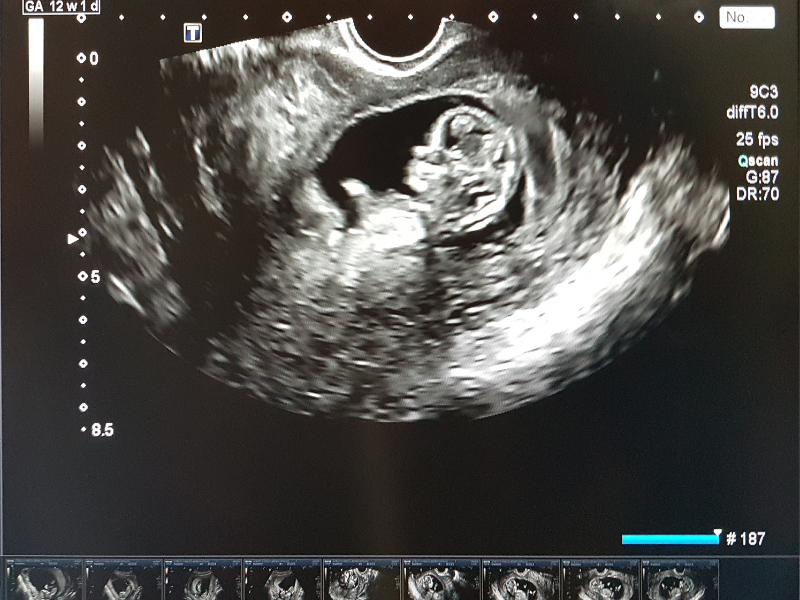
The 12-week scan, also known as the “dating” scan, is the first routine ultrasound you’ll have during your pregnancy. This scan helps determine your baby’s gestational age and provides a more accurate due date. It’s generally done between 10 and 14 weeks, but can be as early as 8 weeks.
Getting Ready for Your 12-Week Scan
Before the scan, you’ll be asked to drink plenty of water and have a full bladder. This helps position your uterus for a clearer image. This can be a challenge if there’s a wait – you’ll feel like you’re ready to burst!
“I had to drink so much water before my scan, only to wait even longer. I felt like I was going to explode! When a nurse asked if I could ‘just let a little bit out,’ I thought, ‘Are you kidding?'” – We’ve all been there.
What Happens During the Scan
When it’s time for the scan, you’ll lie on your back and the sonographer will apply a cooling gel on your abdomen. This gel helps the transducer, the handheld device used to take the scan, to transmit and receive sound waves to create an image of your baby on the monitor. You might feel slight pressure but it won’t hurt you or your baby.
You’ll see a black-and-white image of your baby on the screen. It’s an awe-inspiring moment, whether it’s your first baby or your fifth. The sonographer will help you identify different parts of your baby, though it might look like a small, blurry blob initially.
Sometimes, if the abdominal scan isn’t clear enough, the sonographer may recommend a transvaginal scan. This involves a thin probe to get a closer look from inside and can provide a much clearer image.
What the 12-Week Scan Reveals
- Dating the Pregnancy: The main purpose is to measure your baby from crown to rump to determine your exact stage of pregnancy and give you a precise estimated due date.
- Number of Babies: You’ll find out if you’re expecting twins or even more!
- Development and Growth: The sonographer will check your baby’s spine, limbs, heartbeat, and major organs to ensure they’re developing correctly.
- Placenta Health: They’ll also look at the placenta’s position. A low-lying placenta, which usually moves up as your pregnancy progresses, could cause problems during labor if it doesn’t.
Accuracy of the Dating Scan
While not 100% foolproof, the dating scan provides a much more accurate estimate of your due date than counting from your last period. Sometimes, you may find you’re not as far along as you thought.
Screening Tests During the Scan
You might also be offered a nuchal translucency test, which measures fluid at the back of your baby’s neck to assess the risk of Down’s syndrome. Combined with earlier blood tests, this gives an overall risk assessment for chromosomal conditions like Down’s, Edwards’, and Patau syndrome.
What If the Scan Detects a Problem?
If any issues are spotted, you’ll be referred for further tests and specialist consultations to understand more about the situation. If screening tests indicate a high risk of abnormalities, diagnostic tests like CVS (chorionic villus sampling) and amniocentesis may be offered. These tests are more precise but carry a small risk of miscarriage.
Risks and Considerations
There are no risks to you or your baby from the scan itself. However, think ahead about whether you want the screening tests, as they can lead to difficult decisions about further diagnostic testing.
Bringing Someone to the Scan
You’re usually welcome to bring your partner or a friend for support. However, check with the hospital about their policy on additional guests or bringing children.
How Long Does It Take?
The scan typically takes about 20 minutes, but the entire appointment could be longer due to preparation and discussion.
Can You Find Out Your Baby’s Sex?
At this stage, it’s probably too early to tell the sex of your baby accurately. Most hospitals wait until the 20-week anomaly scan for this. Some hospitals might not tell you at all, so it’s best to check their policy.
Will You Get a Picture?
Most hospitals will provide a picture of your baby, and some even offer DVDs. Check beforehand if there are any additional costs, and bring some cash with you.
How Big Will Your Baby Be?
By the time of the scan, your baby’s size depends on how far along you are. At 10 weeks, they’re about 3cm long; by 13 weeks, around 7cm.
Enjoy this special moment – it’s a big milestone in your pregnancy journey!
Comments